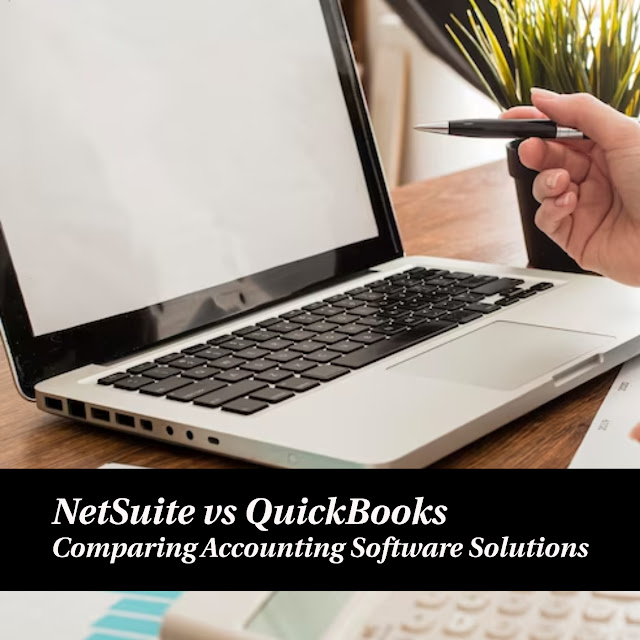Get ready to take your business finances to the next level with QuickBooks Online! Whether you're a small business owner or an accounting professional, finding the right software to manage your financials is crucial. That's why we're here to help you compare two popular versions of QuickBooks Online: Plus and Advanced. These powerful tools offer a range of features designed to streamline your processes and give you greater control over your business finances. So, let's dive in and explore which option is best suited for your unique needs. Get ready to unleash the full potential of QuickBooks Online Plus vs Advanced!
Comparing QuickBooks Online Plus vs Advanced
When it comes to comparing QuickBooks Online Plus vs Advanced, there are a few key differences that can make all the difference for your business.
QuickBooks Online Plus is an excellent choice for small to medium-sized businesses looking for robust accounting features without breaking the bank. With this version, you'll have access to essentials like tracking income and expenses, invoicing customers, managing accounts payable and receivable, and running basic reports.
On the other hand, QuickBooks Online Advanced takes things up a notch with even more advanced features tailored towards larger or growing businesses. This version offers everything in Plus but adds powerful functionalities such as enhanced custom reporting options, batch transactions processing, user permissions customization based on roles and tasks, dedicated customer support team access around the clock – just to name a few.
While both versions offer valuable tools for managing your finances effectively, it's essential to consider your specific needs before making a decision. If you're just starting out or running a smaller operation with straightforward financial requirements, QuickBooks Online Plus may be perfectly sufficient.
However, if you find yourself needing more advanced capabilities or anticipate rapid growth in the near future, then it makes sense to opt for QuickBooks Online Advanced. So take some time to evaluate your current needs and future goals before deciding which version of QuickBooks Online is right for you.
QuickBooks Online Plus
QuickBooks Online Plus is power full accounting software designed to streamline your business finances. With its user-friendly interface and robust features, it's no wonder why many small businesses choose QuickBooks Online Plus as their go-to accounting solution.
One of the standout features of QuickBooks online plus vs advanced is its ability to track income and expenses in real time. You can easily connect your bank accounts, credit cards, and other financial institutions directly to QuickBooks, eliminating the need for manual data entry.
Invoicing has never been easier with QuickBooks Online Plus. You can customize professional-looking invoices and send them directly to your customers via email. The system also allows you to accept online payments, making it convenient for both you and your clients.
Managing inventory is a breeze with QuickBooks Online Plus. You can track stock levels, set reorder points, and even generate purchase orders automatically when inventory runs low. This feature helps prevent stock outs and ensures that you always have enough products on hand.
Another great aspect of QuickBooks Online Plus is its comprehensive reporting capabilities. It provides detailed reports on profits and losses, cash flow statements, balance sheets, and more. These reports give you valuable insights into the financial health of your business so you can make informed decisions moving forward.
QuickBooks Online Plus offers an array of features that cater to the needs of small businesses looking for efficient bookkeeping solutions. Its intuitive interface combined with its powerful tools makes it a top choice among entrepreneurs who want to stay on top of their finances without breaking the bank.
QuickBooks Online Advanced
QuickBooks Online Advanced is an upgraded version of QuickBooks Online Plus, designed for businesses with more complex financial needs. With its advanced features and capabilities, it offers enhanced functionality to help businesses streamline their operations.
One notable feature of QuickBooks Online Advanced is the ability to track and manage multiple locations or entities within a single account. This can be particularly beneficial for companies with branches or franchises spread across different regions. The centralized dashboard provides a comprehensive view of each location's financial performance, allowing business owners to make informed decisions based on real-time data.
Another Advantage of QuickBooks Online Plus vs Advanced is the expanded user access and control settings. It allows administrators to grant specific permissions and restrict access to certain areas of the software, ensuring that sensitive financial information remains secure.
Moreover, QuickBooks Online Advanced offers advanced reporting options that provide deeper insights into your business's finances. Customizable reports enable you to analyze key metrics, trends, and patterns in your company's performance over time.
Additionally, this version includes dedicated customer support through phone calls or chat sessions specifically for QuickBooks Online Advanced users. This ensures prompt assistance whenever you encounter any issues or have questions about using the software effectively.
If your business requires more advanced features such as multi-location tracking, robust user controls, customizable reporting options, and dedicated customer support services then QuickBooks Online Advanced may be the ideal choice for you. It offers comprehensive and reliable financial management tools that are essential for any business of significant size.
Whichever version of QuickBooks Online you choose be sure to take your needs and future goals into account before making a decision. Compare the features of each version and decide which one is best suited for your specific needs.
Pros and Cons of QuickBooks Online Plus and Advanced
QuickBooks Online Plus and Advanced are both powerful accounting software options for businesses. Let's take a look at the pros and cons of each to help you decide which one is best for your business.
One of the main advantages of QuickBooks Online Plus is its affordability. It offers all the essential features that small to medium-sized businesses need, including income and expense tracking, invoicing, inventory management, and financial reporting. With an easy-to-use interface, it allows users to efficiently manage their finances without breaking the bank.
On the other hand, QuickBooks Online Advanced takes things a step further by offering more advanced features designed for larger businesses. This includes customized user permissions, enhanced custom fields, batch import/export capabilities, premium customer support, and up to 25 users. For companies with complex accounting needs or multiple departments that require different access levels, this can be extremely valuable.
However, with these additional features come higher costs. While QuickBooks online plus has a reasonable monthly fee starting at $70 per month (at the time of writing), QuickBooks Online Advanced starts at $150 per month. For some smaller businesses on a tight budget or those who don't require advanced functionality right away, this price difference may be a determining factor.
Another consideration when comparing these two options is scalability. If your business has plans for significant growth in terms of size or complexity in the near future, investing in QuickBooks Online Advanced from the start might save you from having to switch platforms later on.
In summary,
- The pros of choosing QuickBooks Online Plus include affordability and essential features.
- The pros of choosing QuickBooks Online Advanced include advanced functionality suited for larger businesses.
- The cons include higher costs associated with using more advanced features.
- Consider factors such as budget constraints and future growth plans when deciding between them.
Ultimately,
The decision between QuickBooks Online Plus and Advanced comes down to your specific business needs. If you're just starting out or don't require the more advanced features offered by QuickBooks Online Advanced, QuickBooks Online Plus is a great option for you. If you have plans for significant growth in the near future, investing in QuickBooks Online Advanced from the start might save you from having to switch platforms later on.
Which Is Best For Your QuickBooks Online Plus Vs Advanced Business?
When it comes to choosing between QuickBooks Online Plus and Advanced for your business, it all depends on the specific needs and goals of your company. Both versions offer a range of features and tools designed to streamline your financial management processes, but they do have some key differences.
QuickBooks Online Plus is comprehensive accounting software that provides essential features such as tracking income and expenses, managing accounts receivable and payable, creating invoices, and generating reports. It is suitable for small to medium-sized businesses looking for basic bookkeeping functionality.
On the other hand, QuickBooks Online Advanced offers more advanced capabilities like batch invoicing, custom user permissions, enhanced reporting options, inventory tracking with FIFO costing method (First-In-First-Out), and automated workflows with up to 25 user’s access. This version is geared towards larger organizations or those with complex accounting needs.
Pros of QuickBooks Online Plus include its affordability compared to the advanced version and its user-friendly interface that makes it easy to navigate even for non-accounting professionals. However, it may lack certain functionalities required by businesses with more intricate operations.
The main advantage of QuickBooks Online Advanced lies in its extensive feature set that caters to companies with sophisticated requirements. It allows you to customize user roles based on specific job responsibilities and offers advanced reporting options for deeper insights into your business performance.
The decision between QuickBooks Online Plus vs Advanced should be based on an assessment of your company's size, complexity of operations, budget constraints, long-term growth plans, and desired level of control over financial data.
By carefully evaluating these factors against the features offered by each version, you can determine which one will best meet the unique needs of your business.
Conclusion
In the battle between QuickBooks Online Plus vs Advanced, both versions have their strengths and weaknesses. QuickBooks Online Plus offers a robust set of features that cater to the needs of small to medium-sized businesses. It provides essential accounting tools like invoicing, expense tracking, and inventory management. However, it may fall short for businesses with more complex requirements.
On the other hand, QuickBooks Online Advanced comes with advanced features designed to meet the needs of larger or growing companies. It offers enhanced reporting capabilities, customizable user permissions, and powerful automation tools that can streamline workflows. While it may be overkill for smaller businesses or those on a tight budget, it is an excellent choice for companies looking for scalability and flexibility.
Alternatively, if you have a mid-sized or larger business with more intricate financial operations and specific reporting demands – QuickBooks Online Advanced might be worth considering. The additional functionalities offered by this version can help optimize processes in complex environments where customizations are crucial.
The decision should align with your unique business requirements and goals. To ensure you make an informed choice about which version suits you best - evaluate your current needs alongside future growth projections before making a final decision.
Remember that both QuickBooks Online Plus and Advanced offer free trials so that you can test them out firsthand before committing to either option fully. Take advantage of these trials to explore each platform's capabilities thoroughly before making your ultimate selection.








.jpg)
.jpg)

.jpg)